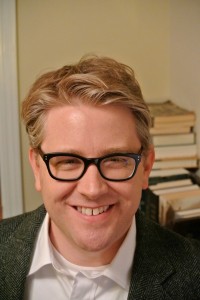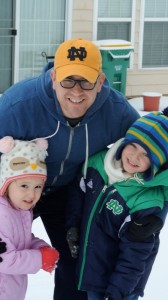
In this next installment of the Alumni Interview Series, we got the chance to catch up with Campbell Irving (2004). He gave us insight into how a busy lawyer with a family can still get creative work done.
1. When did you know that literature was something you could love all your life?
That is an excellent question, primarily because it stumps me. I wish I had some epiphany, some “pick up and read” moment a la St. Augustine wherein my eyes were opened. But sadly that’s not there. I loved stories as a kid. Loved them. Read as much as I could and then I stopped. I hit 12 or so and I stopped. I was a “Cliff’s Notes” student throughout high school and then when I got to college, to Notre Dame, I decided majoring in English made sense because I had this utterly ant-climatic vision of attending law school, so that’s what I did. And when you’ve denied yourself the joy of reading, the joy of literature, out of sheer ignorance or laziness for a while, and then you have these incredible teachers at your disposal, it does slowly trigger something in you. I’m a Southerner, so I began reading William Faulkner and wouldn’t stop reading him throughout my college summers. If I could pick a time when enjoyment turned to love, though, I would have to say the second time I read Jean Toomer’s Cane. First time was a skim for class. Second time was in the summer, after roofing all day, and then with nothing else to do, actually reading that book. That book is something every literate person should read.
2. Give us your fondest memory of your MFA years at Notre Dame.
There are quite a few. I had a radio show during my MFA years at WVFI. It was actually resurrected from my undergraduate days when the incredibly talented Kara Zuaro and I co-hosted. During the MFA, it was the incredibly talented Angela Hur and myself. The take away there is that in both instances I had a great time and in both instances I was the slow one on the program. One time during the MFA years, we performed a radio play written by Kevin Ducey with a number of other MFAers (Corey Madsen and Kelly Kerney, I believe were both involved). To perform anything “written by Kevin Ducey” is an honor, but that was tremendously fun. Great as that was, though, I think the ultimate highlight was a reception hosted by the Program and the Irish Studies department where I got to share a glass(es) of whiskey with Seamus Heaney. That was an event that ekes its way up the Kid #1 birth-Kid #2 birth-wedding line. Rarefied air. He was purely one of the truly kindest and most humble people I think I’ve ever met. Treated me like a prince, and truth be told, compared to many of the other MFA writers in my group, I was nothing special. Incredible night.
3. Can you describe your motivations for pursuing a career in law after the MFA?
Another excellent question with another humdrum answer. Law school was something I always wanted to pursue. It made sense to me to do it, even at a young age. My vision was just to go to college and then law school, work and then die. The problem was I happened upon Valerie Sayers and a number of other writers as an undergrad that inspired me to pursue the MFA while I still could. While I was still young and writing and literature were fresh to me, and they could enjoy the prominent place in my life that they deserved. So, I got very lucky and was accepted at Notre Dame where I cannot effectively describe what an incredible time I had. Ironically, the MFA inspired me to (eventually) return to my plan of attending law school. Law school, and I can say this now with a least some distance from it, does make you a better technical writer. That was one motivation. The MFA, for me, made me a more mature writer, but I was still in a theoretical world where you have just tons of leg room to really explore language and voice and narrative and all of that wonderful stuff. I was not a good technical writer, however, unlike many of the other MFA students. I was too lost in my own world to really become better at that part of it. But, law school did help me improve. How much, I don’t know. There was a lot of ground to make up for. But at least I had/ have the confidence to say that I did improve. The other motivation for law school was that it was a way for me to make a living, raise my family, and when the time presented itself, write. Throughout law school, and even now that I’m actually practicing, I would read up on these great writers who had other careers that were at least somewhat disengaged from literature. But I must say I very much enjoy what I do in my 9-to-5 (or 8-to-8, but who’s counting). It is very, very different from writing, but good different.
4. Were there specific skills that you picked up in the MFA Program that lead to your success as a lawyer?
Absolutely. The ability to think creatively is critical. People sometimes think the life of a lawyer is either very thrilling and sexy, like you see on television, or very dull and rote. In my limited experience, neither is exactly true. However, you do need passion for it (like in the television shows) and you need to be organized. I am better at the former, to be very honest. But you also have to be creative. The answers to questions aren’t always simple. You can’t always plug in a law or legal case to explain something, and you can’t simply argue emphatically without some backup. When the answer is hard to determine, you have to be able to dissect what’s in front of you, imagine it going in various directions, and then see how an answer or an assumption deals with those directions. The intellectual and creative processes are very similar to what I try to do when writing a story. I think that’s why I enjoy it. So, you have thinking creatively, but also the ability to really dissect language and break it down to its base elements. This latter skill is something that, for me, does not come naturally, but was learned through editing my work during the MFA Program, as well as reading others’ works. The other skill, and I’m not sure this is technically a skill, is curiosity. I think curiosity is a much undervalued element of writing. You want to learn about the world as you write about it. How things work, who people are, all these questions are, for me, the most exciting elements of writing fiction. I work in-house for a large company. And my clients cover a very large swathe of provisions and fields, as well as countries and cultures. The only way I can do my job and not get fired is if I have that same curiosity that I was given great freedom to pursue during my MFA years. That freedom really allowed me to make curiosity part of my everyday, part of who I now am. And it’s carried over to my work now as an attorney. For example, I’m an environmental lawyer. Before this job, I had very little interaction with environmental issues. Now, it’s something I dedicate crazy hours to with no scientific or technical background. But, curiosity carries me forward, and humility (a trait honed against the backdrop of being very average compared to other MFA students) keeps me from collapsing when I make my numerous mistakes.
5. What creative projects are you working on now? How do you find time to work on them?
 I am actually working on a novel right now, and have been for a while. I used to pride myself on writing copiously as an undergrad and MFA student. None of it very good. But now, the process has been slowed considerably. My writing times are very early in the morning and very late at night. I have two active, crazy little ones, and so on my weekends, I try to dedicate as much time with them as I can. So, similar to law school when both of them were born, my free time, my writing time, is during their sleeping hours. My wife also writes, so it works out ok on the marriage end. But, I tend to write best when in a fever, when I cannot concentrate on anything else. So, that makes for some rough Friday and Saturday nights when I am awoken the next morning at 5 am by small hands smacking me across the face. I also have 2 short stories that I am returning to for some substantial edits.
I am actually working on a novel right now, and have been for a while. I used to pride myself on writing copiously as an undergrad and MFA student. None of it very good. But now, the process has been slowed considerably. My writing times are very early in the morning and very late at night. I have two active, crazy little ones, and so on my weekends, I try to dedicate as much time with them as I can. So, similar to law school when both of them were born, my free time, my writing time, is during their sleeping hours. My wife also writes, so it works out ok on the marriage end. But, I tend to write best when in a fever, when I cannot concentrate on anything else. So, that makes for some rough Friday and Saturday nights when I am awoken the next morning at 5 am by small hands smacking me across the face. I also have 2 short stories that I am returning to for some substantial edits.
6. Could you go into your inspiration for what you’re working on now?
The novel is based very loosely on a tragedy that took place in what I consider my home town of Douglas, Georgia, many years ago. There are a litany of factual differences, so as to be its own story. I am trying to explore the two sides of it. The family who has lost a loved one and the people who were behind it. One of the blessings of studying the law, at least this is true of me, is that you gain a different perspective on the various actors involved in something criminal. That doesn’t mean the lines are blurred at all. God forbid there’d be chaos. But there is complexity. Complexity surrounding those who do something unspeakable and those who must then deal with it. I had the great pleasure during law school of contributing to an academic work dealing with juvenile criminals. That, mixed with some of the personal research I did both during my undergrad and MFA days, has hopefully prepared me to do the subject justice. If it hasn’t, then I might be the worst MFA alum in Notre Dame history.
7. Given all your commitments do you still make time to read? If so, what are you reading? Would you recommend it? Why?
Reading is something you have to make time for. It’s not easy. Work, kids, marriage, volunteer groups, taking care of sickly parents, etc. You just have to make time for it. When I am writing, or trying to write, I tend not to read a lot of literature. The reason for that is I am easily inspired. I’m not so set in my ways that I know how to write the way I want no matter what masterpiece may be calling me otherwise. This is one of problems with being a “Cliff’s Notes” student in high school. I haven’t matured creatively compared to the very successful MFA students I got to work with. Every piece of fiction or poetry I read demands my emulation. For example, I read “The Sister’s Brothers” last year by Patrick DeWitt. Great book. Funny, simple, but still fascinating. Perfectly “good” reading for a confused lawyer. But, when I went to write, I suddenly started drafting out dialogue in his cool, deadpan way that wasn’t me writing, it was me imitating, miserably, Patrick DeWitt. I had the same experience with “The Brief Wondrous Life of Oscar Wao” by Junot Diaz. The book is so incredible, to me, and the character so worthy of your time, of your late hours, that I felt pressured to try to be like that even knowing I could not. So, when I am trying to write, I tend to read a lot of history and philosophy. I am right now going through the Oxford History of the United States series and I just finished Being Given by Jean Luc Marion (a personal hero). The one exception I have made recently, however, is Valerie Sayers’ The Powers. I made the exception for a few reasons. One was that she is one of the most special and important friends and mentors of my life, so I have to. Another reason is that I cannot write relationships the way she does. I cannot write female characters the way she does, though it would be a dream. However, when I read The Powers, which is wonderful by the way, and I sit down to imitate Valerie Sayers, what happens is not so much that I get derailed like with some other writers I read. Instead, what I end up doing is I write the female characters powerful and complex (or my attempt at such), and the relationships, familial, physical, etc., with the understanding that all of what I am writing is going to be changed dramatically. But, in my failing efforts, I will at the very least come to a greater understanding and appreciation of those female characters and those relationships through the exercise. I’ve read all of her works, so I know when I am drifting into Sayersisms in my own writing and can adjust when I have done a poor job. That’s the beauty of reading a great writer’s work when you’re comfortable with them and know them well enough to recognize when you aren’t being truthful to your voice, but you can still glean a great deal from that mistake. That’s why The Powers is so tremendous. That’s why she is, too.
Cheers,
Dev
